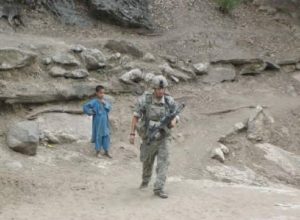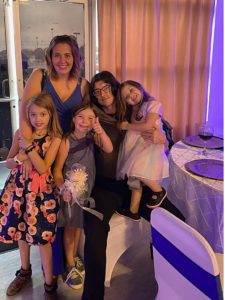by Isaiah Robles
 Growing up, Andrew came from a family of individuals who served. From emergency medical services to the military, Andrew was heavily influenced to follow the same path. It was an important test to himself that he wanted to fulfill. During his time as a member of the infantry, Andrew suffered from a traumatic brain injury in 2009.
Growing up, Andrew came from a family of individuals who served. From emergency medical services to the military, Andrew was heavily influenced to follow the same path. It was an important test to himself that he wanted to fulfill. During his time as a member of the infantry, Andrew suffered from a traumatic brain injury in 2009.
While serving in the U.S. Army at age 19, Andrew had a severe accident while walking with his unit at night, falling 10-feet into a ditch headfirst. Surprisingly, it was not until nine years later that he decided to go in for an MRI.
“There is a big stigma about getting seen for anything medically significant because it is seen as potentially damaging in the long run,” Andrew explained. Little did he know at that time, Andrew would be finding out a significant detail about himself.
Andrew, who was 28 years old at the time, learned that he has partial absence of the corpus callosum (P-ACC). A medical term he was unfamiliar with, Andrew went directly to the internet for answers. “I turned to social media and looked up all the information I could.”
Through his research, Andrew came across the National Organization for Disorders of the Corpus Callosum (NODCC) Facebook page. The NODCC provided Andrew with a great deal of insight. Prior to Andrew’s test results, he never felt like he had a disability of any kind. However, Andrew says his results gave him an explanation for his personality.
“I noticed that I would be uncomfortable in active environments, large amounts of information would be difficult to process and makes me anxious,” Andrew said. “You can imagine being in the army and dealing with this was a challenge.”
Through the resources provided on the NODCC site, Andrew was able to make connections and understand more about himself. By the time Andrew received his test results, he had already accomplished so much in life that he was not going to stop setting goals for himself just yet. In fact, he saw his diagnosis as another opportunity to test himself.
 Now, Andrew is pursuing a bachelor’s degree in general education with a focus on health. At the same time, he is a husband helping his wife raise three children, while balancing a Monday through Friday work schedule. Like most parents, Andrew looks forward to spending his spare time with his three children. He even finds time on weekends when he is not working to volunteer with special needs kids at his church.
Now, Andrew is pursuing a bachelor’s degree in general education with a focus on health. At the same time, he is a husband helping his wife raise three children, while balancing a Monday through Friday work schedule. Like most parents, Andrew looks forward to spending his spare time with his three children. He even finds time on weekends when he is not working to volunteer with special needs kids at his church.
Despite the challenges that he faced before and after his diagnosis, Andrew pushed himself through the obstacles that many individuals with ACC struggle with. Andrew also understands that there are families and individuals out there who experience this condition in many ways.
Andrew has a message of reassurance for parents who are finding out their child has a disorder of the corpus callosum. “Coming from a parent, do not jump to conclusions. Don’t think about the worst possible situation, take one step at a time. My diagnosis has taught me about my challenges and helps explain my personality. It does not make me any less of a person.”
This story is part of the Adults with DCC series that showcases the abilities and lives of real adults living with disorders of the corpus callosum. Students at The University of Texas at Arlington interviewed and wrote stories for this series.

